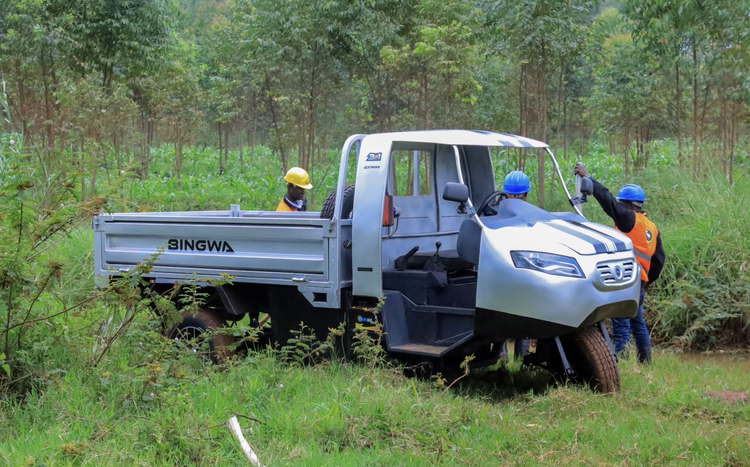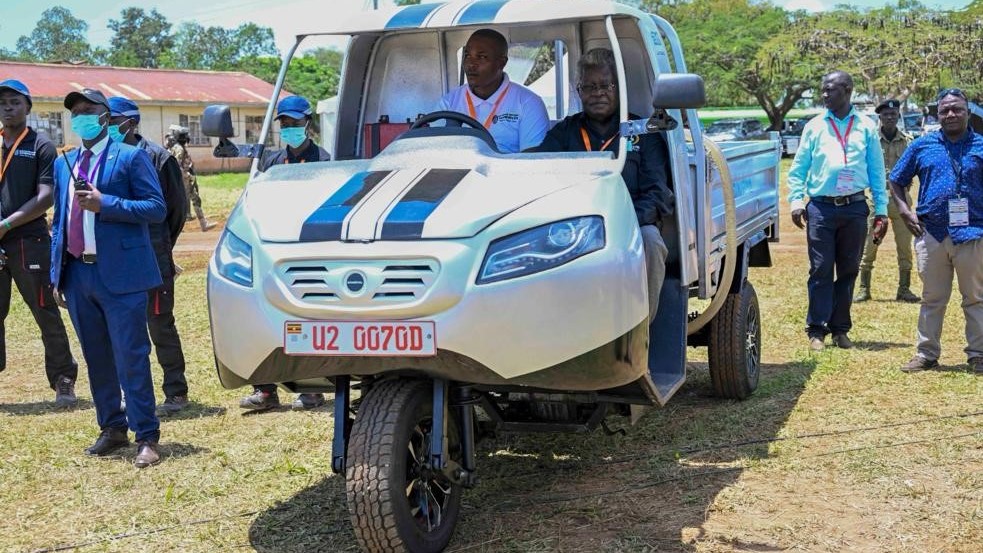The innovative Bingwa Tricycle, a remarkable creation poised to bring transformative benefits to farmers and rural households across Uganda, was officially launched on October 9th 2024 during the country’s 61st Independence Day celebrations in the Kitgum district. This groundbreaking Bingwa Trike is the brainchild of a dedicated group of self-trained innovators, spearheaded by Rogers Mubiru from Kevoton Motions Engineering Ltd. Its production took place at the esteemed Kiira Motors Vehicle Plant in Jinja, with the crucial engine casting completed at the John Lugendo Foundry in Kampala. The Bingwa, often referred to as Uganda’s Tricycle, is specifically designed to address the pressing needs of rural Uganda, offering a versatile range of capabilities.
Key Features and Functionality of the Bingwa Trike
The Bingwa tricycle is powered by a fuel-efficient 0.8-liter two-stroke engine. This engine choice provides a superior power-to-weight ratio compared to traditional four-stroke engines, ensuring the vehicle is both efficient and highly versatile, making it ideally suited for a multitude of tasks prevalent in rural settings.
During a significant flag-off ceremony at the Kiira Motors Plant, Dr. Monica Musenero, the Minister of Science, Technology, and Innovation, eloquently highlighted the impressive features of the Bingwa. This Uganda home grown tricycle boasts the capacity to transport up to 1,000 kilograms of goods, pump an impressive 6,000 liters of water per hour for irrigation and domestic use, and generate a substantial 6 kW of electricity every hour, providing much-needed power to rural households.

These core capabilities directly tackle the urgent challenges faced by farmers and rural communities in Uganda, where access to essential services such as reliable irrigation and electricity remains a significant hurdle for many. The Bingwa Tricycle offers a comprehensive solution.
Project Support Behind Uganda’s Bingwa
The Bingwa Tricycle project received vital financial backing from the STI Secretariat, operating under the Office of the President. This support was channeled through the National Research and Innovation Program, directly funding Kevoton Motions in their innovative endeavor. Kiira Motors also played a pivotal role by providing crucial incubation support, effectively nurturing the initial concept and helping to transform it into a tangible reality – the Bingwa Trike.
The design of this Uganda-made tricycle is meticulously tailored to meet the specific needs of Uganda’s rural population, where agriculture forms the backbone of livelihoods for a significant majority. With approximately 80% of the population engaged in farming, the historical lack of access to efficient irrigation and reliable electricity has posed a considerable barrier to enhancing agricultural productivity and overall living standards. Dr. Musenero strongly emphasized the transformative potential of the Bingwa to revolutionize rural livelihoods, significantly boosting agricultural output and improving the overall quality of life for the people of Uganda.
Also Read: Why Kigali is the Cleanest City in Africa – LeeulWebs
Rogers Mubiru, the visionary founder and director at Kevoton Motions Engineering Ltd., harbors ambitious plans for the widespread adoption of the Bingwa. His vision includes deploying 600 units across various sub-counties, with the primary goal of further elevating household livelihoods and effectively addressing critical challenges prevalent in rural areas through the capabilities of this Bingwa Tricycle.
Local Manufacturing and the Bingwa Trike
Local manufacturing is a cornerstone of the Bingwa Tricycle project, with an impressive 55% of its components being sourced and produced within Uganda. This strong emphasis on local production aligns perfectly with Uganda’s national efforts to promote localization and value addition within the manufacturing sector, contributing significantly to economic development and fostering job creation within the country.
The Cost-Effectiveness of the Bingwa Tricycle
The Uganda Development Bank (UDB) demonstrated its commitment to this impactful project by allocating $250,000 specifically to support crucial project planning and ensure production readiness. This financial support ensures that the Bingwa tricycle can effectively meet the diverse needs of rural communities across Uganda.
Priced at Shs 28 million, the Bingwa offers a compelling value proposition. Its multi-functional capabilities provide significantly more utility compared to the cost and effort of purchasing separate tuk-tuks for transport, individual water pumps for irrigation, and standalone power generators. The estimated market potential of 100,000 units in the medium term strongly suggests that the Bingwa has the potential to make a substantial contribution to Uganda’s economic progress by measurably improving the lives of rural households and farmers, actively promoting local manufacturing, and directly addressing the critical needs for water and electricity in these communities.
